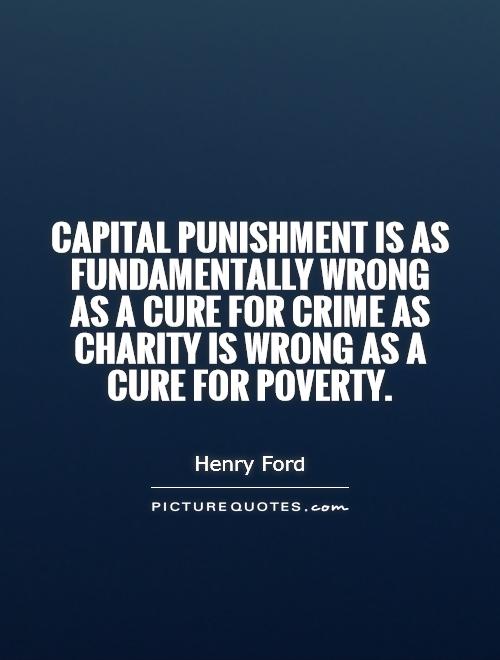Capital punishment is as fundamentally wrong as a cure for crime as charity is wrong as a cure for poverty

Capital punishment is as fundamentally wrong as a cure for crime as charity is wrong as a cure for poverty
Henry Ford, the American industrialist and founder of the Ford Motor Company, was a man known for his innovative ideas and revolutionary approach to business. However, when it comes to the issue of capital punishment, Ford's views were surprisingly conservative and outdated.Ford believed in the concept of "an eye for an eye" and supported the use of capital punishment as a means of deterring crime. He saw it as a necessary evil in order to maintain law and order in society. However, Ford failed to recognize the inherent flaws in the system of capital punishment and the fact that it does not actually serve as an effective deterrent to crime.
In his statement that "Capital punishment is as fundamentally wrong as a cure for crime as charity is wrong as a cure for poverty," Ford is essentially arguing that punishment is the only way to address crime, just as charity is the only way to address poverty. However, this simplistic view fails to take into account the root causes of crime and poverty, and the need for more comprehensive and holistic solutions.
Ford's belief in the efficacy of capital punishment as a deterrent to crime is misguided and ignores the overwhelming evidence that shows that it is not an effective means of reducing crime rates. In fact, studies have shown that the death penalty does not deter crime any more effectively than other forms of punishment, such as life imprisonment.
Furthermore, the use of capital punishment raises serious ethical and moral concerns, as it involves the state-sanctioned taking of a human life. Ford's support for capital punishment reflects a lack of empathy and understanding of the complexities of the criminal justice system and the need for more humane and effective ways of addressing crime.












 Friendship Quotes
Friendship Quotes Love Quotes
Love Quotes Life Quotes
Life Quotes Funny Quotes
Funny Quotes Motivational Quotes
Motivational Quotes Inspirational Quotes
Inspirational Quotes